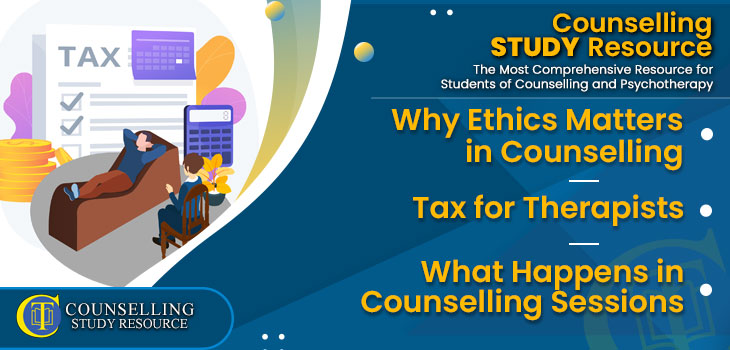275 – Tax for Therapists
Why Ethics Matters in Counselling – What Happens in Counselling Sessions
In Episode 275 of the Counselling Tutor Podcast, your hosts Rory Lees-Oakes and Ken Kelly take us through this week’s three topics:
- Firstly in ‘Student Services’, we look at why ethics matter.
- Then in ‘Ethical, Sustainable Counselling’ we look at tax for therapists and ways to get your tax affairs in order.
- And lastly in ‘Practice Matters’, Rory speaks with Chrissie Henson about her new book ‘A Look Inside the Therapy Room’, and how it can help students and prospective clients get a sense of what happens in counselling sessions.
Why Ethics Matters in Counselling [starts at 02:38 mins]
Counselling Foundations is sponsored by
Counselling Skills Academy
Learn counselling techniques by seeing counselling skills used in real sessions by qualified therapists.
Real sessions - real-life presentations - real skills.
When it comes to counselling, it’s important that you’re practicing safely and ethically. In this section, Rory and Ken discuss the benefits of knowing your ethical framework inside out:
- An ethical framework offers reassurance and protection to the general public.
- It’s a general agreement of what is ethical so that there is uniformity in the way counsellors practice.
- It provides a benchmark.
- Your ethical framework should always be with you to ensure you’re practicing ethically.
- It’s important for keeping everyone working to the same standards.
- It can help answer questions you might have about your practice:
- What is ethical advertising?
- What is an appropriate client relationship?
- How should I be record keeping/note taking?
- What should I be including in my contracts?
A handout on Top Five Tips for Writing an Assignment on Ethics in Counselling is available for download in the green button above.
Tax for Therapists [starts at 18:49 mins]
When running your own practice, your tax isn’t automatically taken out of your wage, giving you another thing to think about.
In this section on tax for therapists, Rory and Ken discuss some things they consider when it comes to getting their tax affairs in order:
- You might want to consider opening a separate bank account for you to immediately put aside your tax money. This removes any temptation for you to spend it and helps form the mindset that this money isn’t actually your own.
- To help you sort the tax for your therapy practice, consider hiring an accountant. This can help you look into what you can legally claim back from your tax as business expenses. A good accountant will pay for themselves with the savings they help you make through their advice.
- Tax can creep up on you – make sure you’re prepared for it when it comes.
- Understand the different kinds of tax and which ones you are expected to pay as a therapist.
What Happens in Counselling Sessions [starts at 31:12 mins]
The National Counselling Society is proud to sponsor Practice Matters.
NCS are really excited to have launched their Children and Young People Therapist Register for counsellors working with the younger age group.
In this week’s ‘Practice Matters’, Rory speaks with Chrissie Henson about her new book ‘A Look Inside the Therapy Room’, and how it can help students and prospective clients get a sense of what happens in counselling sessions.
The main points of this discussion include:
- Chrissie’s book helps address some of the taboos or concerns people might have about counselling.
- Can help students of counselling to get to know what happens in real life sessions and experiences.
- Focuses on some specific areas in therapy that might not be spoken about as often such as:
- Young people – the feeling of being away from home for the first time and the effects it can have, e.g. university.
- Disability in therapy – both the seen and the unseen.
- Coping with death.
- Dealing with rejection – whether it is from a parent, a lover, or a job.
- Men in therapy - talking about their feelings, opening up, being vulnerable, increasing awareness of male rape.
- Includes pauses for thought at the end of chapters to allow the reader to connect with what they have just read, and offering up a different way for the reader to think about the content.


